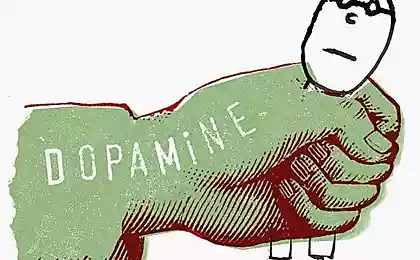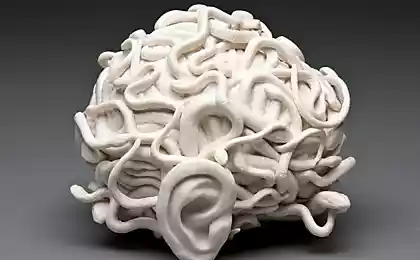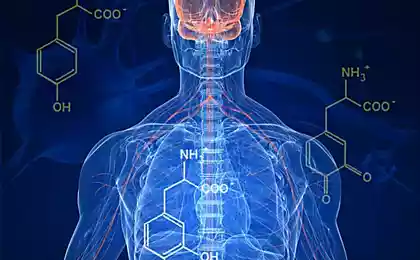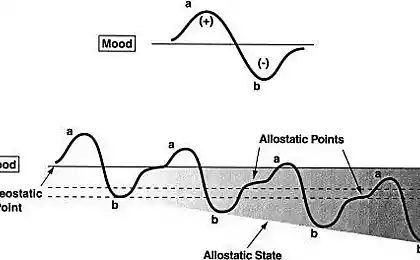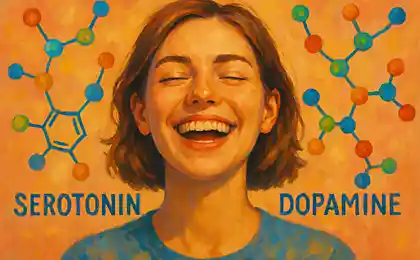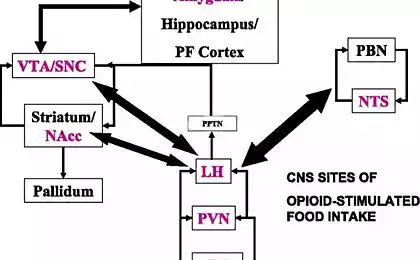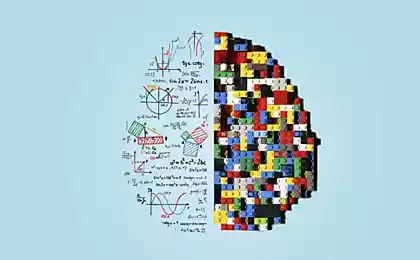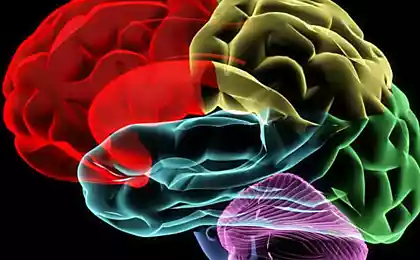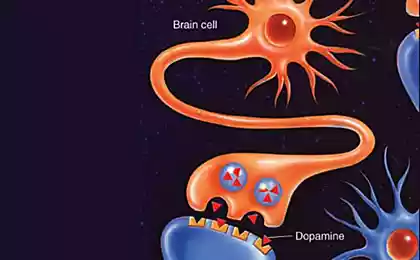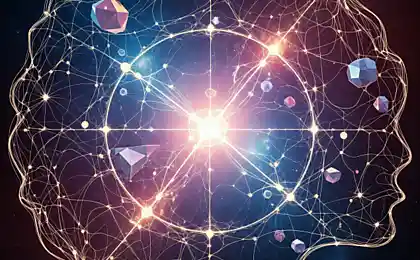202
Dopamine receptors: Learn to distinguish between happiness and the promise of happiness
Don't push the pedal. It is important to preserve and protect what pleases you and not do what kills our receptivity.It is necessary not to introduce the desired substances into the body, but to help the body independently produce them. Do not become dependent on what can be avoided. Let's call it "not tempting fate." Don’t be tempted, don’t be tempted, you know where free cheese is, don’t you?
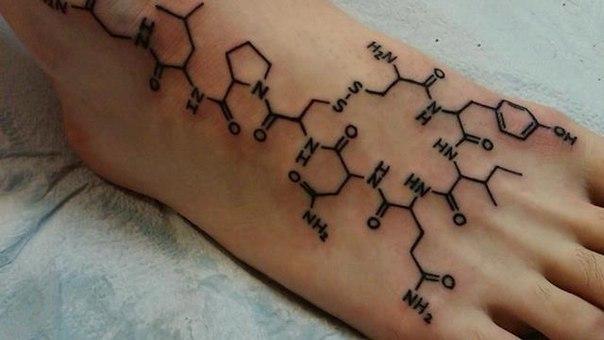
Achieve your goals. It is very useful to formulate a conscious goal, make an informed decision and implement it. This, when used systematically, trains a “goal reflex.” Dopamine is produced by pleasure, it is, so to speak, a hedonistic substance. Fortunately, all you have to do is train your brain. It doesn’t matter what you’ve achieved – you’ve finally reached a shawarma kiosk or defended your doctoral thesis – achieving your goal translates the pleasure centers into a “holiday mode.” It is not necessary to set ambitious goals. Start evaluating daily tasks as accomplishments. Have you been on Facebook all morning?! You're doing great! Receive your reward because your goal is achieved. Dopamine in every house! Now, where does the advice come from dividing big tasks into small ones? More dopamine, friends!
Celebrate and reward yourself for every small achievement.
Down with modesty! You have to celebrate and reward yourself! This is very important, as people are often bored with their even major achievements.
Plan good things in advance and think about them.
Here’s a simple exercise: Plan one pleasant thing for you tomorrow and think about it periodically throughout the day. Yes, even the thought of the upcoming pleasant business causes a release of dopamine.
Learn to distinguish between “happiness” and “promise of happiness.”
Yeah, it's hard. But daily experiments will make you feel the difference. Let's make an indicative chart.
Most of us pay much more attention to the promise of pleasurable feelings than to the invalid unpleasant sensation that accompanies dopamine desire. Try to track when desire causes stress and anxiety. When you give in to temptation, do you respond to the promise of reward? Or are you trying to relieve anxiety?
Dopamine, The Promise of Happiness "exciting pleasure" Endorphins "happiness" "satisfying pleasure" Anticipation of pleasure Direct experience of pleasure Fear of losing (immediateness, deficiency) Savoring anxiety, unpleasant itching and irritability Peace and bliss Physical symptoms of stress Relaxation Action Peace, sleep Very often - invented illusory needs Satisfaction of your personal present needs. Ironically, most true needs coincide with physical, psychological, and social resources. In achieving a goal, there is often devastation if the goal was false.
Obviously, the promise of a reward is necessary for us to be involved in life. If we're lucky, the reinforcement system will not only give us that -- but let's hope it doesn't turn against us. We live in a world of technology, advertising, round-the-clock opportunities that constantly arouse our desires and rarely satisfy them. If we want to own ourselves, we need to distinguish the real rewards that give our lives meaning from the false rewards that distract us and create addictions. Learning this is probably the best we can do. It’s not always easy, but understanding the brain can make things a little easier. Improve the serotonin system. Systems can work incoherently from each other.
Some people who are depressed may not experience any pleasure at all, and their appetizing and consuming systems are not functioning (low dopamine). They are not able to anticipate a good pastime, and even if their friends manage to get them to a restaurant or other pleasant place, they cannot get pleasure from it. However, some people who are depressed, despite this inability to anticipate, feel elevated when forced to go to dinner or an event. This is because, although the “anticipatory appetite system” works poorly in them, the second system (final pleasure system) continues to function (endorphins are normal).
Food and supplements.
Protein food containing tyrosine and phenylalainine (amino acids from which dopamine is synthesized in the body): any high-quality protein - especially legumes, fish, eggs, cottage cheese. You can take these amino acids separately, but I don't see much sense in this.
Exercise to develop protection.
Under the microscope: Who controls your dopaminergic neurons? Looking for where advertising promises you a sweet future? Watch the salespeople try to get you off the promise of a reward. Play this game with you when you go to the grocery store or see ads. What smells surround you? What do you see? You hear me? Recognizing the techniques of temptation, you can see the product as it is, and resist temptation.
Have many goals for dopamine! So that you will be happy and you can wait! If you focus all your passion on one thing, your dopamine becomes extremely vulnerable. The more joyful hobbies and activities you have, the better. Make a list of things that please you. Yeah, right now. Dopamine your unpleasant affairs.
Unpleasant household chores can be made more appealing by awarding them a prize. And if the rewards for actions are pushed into the distant future, you can squeeze a little more dopamine out of neurons, dreaming of the time when the long-awaited reward for labor will come (as in lottery advertising).
You accept the promise of a reward for happiness.The promise of reward is extremely strong, and we continue to pursue what does not bring happiness and consume what brings more suffering than pleasure. Since chasing a reward is the main purpose of dopamine, it will never tell you to stop – even if the result does not live up to the promise. When we free ourselves from the promise of false rewards, we often find that the object in which we sought happiness was the main source of our suffering. Experiment: Check out the reward promise
Test the promise of reward from temptation, which you regularly succumb to because the brain assures you that it will make you happy. Most of my classes were food, shopping, TV, and spending time online, from email to poker. Carefully indulge in entertainment, do not rush into it with your head. Notice what the promise of reward gives you: anticipation, hope, ecstasy, anxiety, salivation—everything that happens in your mind and body. Then allow yourself to give up. What is the experience of temptation compared to waiting? Is the promise of reward gone, or is it still encouraging you to eat more, spend more, sit longer? When do you get tired (if at all)? Or are you just reaching a point where you’re no longer able to continue because you’re overeating, tired, irritated, late, or the “reward” is over?
People who try this exercise usually come up with one of two results. Some find that when they are attentive to the experience of pleasure, they are satisfied with far less than they expected. Others realize that the experience is not satisfying at all, revealing the huge gap between the promise of reward and the actual experience. Both observations will help you better master yourself in what seemed beyond your control.
Fall in love.
Have a strong social support network.Share joyful things and plan for others.
Sleep.
Exercise.But you knew the last two things without me, right?
It is based on Kelly McGonigal’s book The Power of Will. I suggest you read it.published
Author: Andrey Beloveshkin P.S. And remember, just by changing our consciousness, we change the world together! © Join us on Facebook , VKontakte, Odnoklassniki
Source: www.beloveshkin.com/2014/12/dopamine-2.html

Achieve your goals. It is very useful to formulate a conscious goal, make an informed decision and implement it. This, when used systematically, trains a “goal reflex.” Dopamine is produced by pleasure, it is, so to speak, a hedonistic substance. Fortunately, all you have to do is train your brain. It doesn’t matter what you’ve achieved – you’ve finally reached a shawarma kiosk or defended your doctoral thesis – achieving your goal translates the pleasure centers into a “holiday mode.” It is not necessary to set ambitious goals. Start evaluating daily tasks as accomplishments. Have you been on Facebook all morning?! You're doing great! Receive your reward because your goal is achieved. Dopamine in every house! Now, where does the advice come from dividing big tasks into small ones? More dopamine, friends!
Celebrate and reward yourself for every small achievement.
Down with modesty! You have to celebrate and reward yourself! This is very important, as people are often bored with their even major achievements.
Plan good things in advance and think about them.
Here’s a simple exercise: Plan one pleasant thing for you tomorrow and think about it periodically throughout the day. Yes, even the thought of the upcoming pleasant business causes a release of dopamine.
Learn to distinguish between “happiness” and “promise of happiness.”
Yeah, it's hard. But daily experiments will make you feel the difference. Let's make an indicative chart.
Most of us pay much more attention to the promise of pleasurable feelings than to the invalid unpleasant sensation that accompanies dopamine desire. Try to track when desire causes stress and anxiety. When you give in to temptation, do you respond to the promise of reward? Or are you trying to relieve anxiety?
Dopamine, The Promise of Happiness "exciting pleasure" Endorphins "happiness" "satisfying pleasure" Anticipation of pleasure Direct experience of pleasure Fear of losing (immediateness, deficiency) Savoring anxiety, unpleasant itching and irritability Peace and bliss Physical symptoms of stress Relaxation Action Peace, sleep Very often - invented illusory needs Satisfaction of your personal present needs. Ironically, most true needs coincide with physical, psychological, and social resources. In achieving a goal, there is often devastation if the goal was false.
Obviously, the promise of a reward is necessary for us to be involved in life. If we're lucky, the reinforcement system will not only give us that -- but let's hope it doesn't turn against us. We live in a world of technology, advertising, round-the-clock opportunities that constantly arouse our desires and rarely satisfy them. If we want to own ourselves, we need to distinguish the real rewards that give our lives meaning from the false rewards that distract us and create addictions. Learning this is probably the best we can do. It’s not always easy, but understanding the brain can make things a little easier. Improve the serotonin system. Systems can work incoherently from each other.
Some people who are depressed may not experience any pleasure at all, and their appetizing and consuming systems are not functioning (low dopamine). They are not able to anticipate a good pastime, and even if their friends manage to get them to a restaurant or other pleasant place, they cannot get pleasure from it. However, some people who are depressed, despite this inability to anticipate, feel elevated when forced to go to dinner or an event. This is because, although the “anticipatory appetite system” works poorly in them, the second system (final pleasure system) continues to function (endorphins are normal).
Food and supplements.
Protein food containing tyrosine and phenylalainine (amino acids from which dopamine is synthesized in the body): any high-quality protein - especially legumes, fish, eggs, cottage cheese. You can take these amino acids separately, but I don't see much sense in this.
Exercise to develop protection.
Under the microscope: Who controls your dopaminergic neurons? Looking for where advertising promises you a sweet future? Watch the salespeople try to get you off the promise of a reward. Play this game with you when you go to the grocery store or see ads. What smells surround you? What do you see? You hear me? Recognizing the techniques of temptation, you can see the product as it is, and resist temptation.
Have many goals for dopamine! So that you will be happy and you can wait! If you focus all your passion on one thing, your dopamine becomes extremely vulnerable. The more joyful hobbies and activities you have, the better. Make a list of things that please you. Yeah, right now. Dopamine your unpleasant affairs.
Unpleasant household chores can be made more appealing by awarding them a prize. And if the rewards for actions are pushed into the distant future, you can squeeze a little more dopamine out of neurons, dreaming of the time when the long-awaited reward for labor will come (as in lottery advertising).
You accept the promise of a reward for happiness.The promise of reward is extremely strong, and we continue to pursue what does not bring happiness and consume what brings more suffering than pleasure. Since chasing a reward is the main purpose of dopamine, it will never tell you to stop – even if the result does not live up to the promise. When we free ourselves from the promise of false rewards, we often find that the object in which we sought happiness was the main source of our suffering. Experiment: Check out the reward promise
Test the promise of reward from temptation, which you regularly succumb to because the brain assures you that it will make you happy. Most of my classes were food, shopping, TV, and spending time online, from email to poker. Carefully indulge in entertainment, do not rush into it with your head. Notice what the promise of reward gives you: anticipation, hope, ecstasy, anxiety, salivation—everything that happens in your mind and body. Then allow yourself to give up. What is the experience of temptation compared to waiting? Is the promise of reward gone, or is it still encouraging you to eat more, spend more, sit longer? When do you get tired (if at all)? Or are you just reaching a point where you’re no longer able to continue because you’re overeating, tired, irritated, late, or the “reward” is over?
People who try this exercise usually come up with one of two results. Some find that when they are attentive to the experience of pleasure, they are satisfied with far less than they expected. Others realize that the experience is not satisfying at all, revealing the huge gap between the promise of reward and the actual experience. Both observations will help you better master yourself in what seemed beyond your control.
Fall in love.
Have a strong social support network.Share joyful things and plan for others.
Sleep.
Exercise.But you knew the last two things without me, right?
It is based on Kelly McGonigal’s book The Power of Will. I suggest you read it.published
Author: Andrey Beloveshkin P.S. And remember, just by changing our consciousness, we change the world together! © Join us on Facebook , VKontakte, Odnoklassniki
Source: www.beloveshkin.com/2014/12/dopamine-2.html
Why not grow muscle and burn fat at the same time
Japanese soup ramen: exotic, delicious and healthy!
